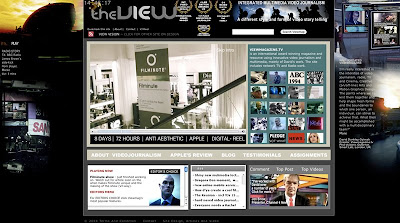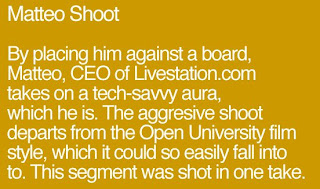"Do you want peace?"By the fourth time vanguard video journalist
Ruud Elmendorp had sought an answer from one of the Lord Resistance' child soldiers, their eyes glazed with nothingness, two thoughts cross your mind.
Ruud is either being very reckless or very clever.
As a seasoned hack and video journalists, Dutch-born
Ruud wears the experience of working Africa with such aplomb; he demonstrates he knows the area, its people and is highly respectful.
Question answered.
It was no small wonder the film took a major award, and garnered many critical reviews.
And here evidently lies two core values of video journalism on display.
1. The ability to unearth stories - a quality many of us possess.
2. The ability to on-the-fly film and weave together visuals in which the sum of their parts tell a compelling story - something many of us are learning.
One of the biggest assets for video journalism is how its
widening the visual documentation of stories, from areas previously overlooked by mainstream.
But also, and this is equally big, how it can fundamentally redress the way we tell (news) stories to give them a boldness and to make you the viewer sit up and care about what you're watching.
That human endeavor, social reaction, our fears and hopes are universal and whilst Africa [ a figure of speech] may be 1000s of miles away from where ever you are, thus dimming our care quotient and appropriate response, the skill of the VJ is to make you care.
These are stories that are often unapologetic and devoid of celeb culture, hiding the template of good strong film making.
You've either come across them, just the characters are different as well as the contextual profoundness of the issues relative to their origin, or they take the mind on that mysterious journey good films are capable of executing.
Poverty in Africa? But you wouldn't have to search hard enough to find poverty in and around the big cities we occupy. The destitution is relative.
Today one of the richest banks in the world filed for
bankruptcy. How can that be?
Context and relativity!
You've seen it may times, when the same networks pitch at the same stories, yet their final product differ. Many times they might almost look the same.
If news is about relaying contracted events, which in story telling shrunk to the point of anorexia, then video journalism is about restoring news stories as must sees, the film maker as the loquacious technician.
A film maker who understands how to arc the film to keep you tuned will not be worried by the fixed stanza of 1.20 minutes or 2.20.
If it's online, it should be as long as it is, in the same way a skilled film maker can have the boldness to take you up to three hours if the material is compelling.
We're wearing old clothes sown for us in a different era. Nostalgia and our parents telling us there's no more money to buy new ones, keeps these ill-fitted covers on our back.
The truncated duration of news and its a la
carte delivery arose by default, then re-enforced by pollsters' audience research.
In the 90s BBC Director General John
Birt insisted on a style broadcasters jokingly
referred to as "
Birts mission to explain".
A package should be all but self-contained. Aha the formulae.
The skilled visual broadcaster might not have adopted this but was masterful at grabbing your interests. Go back and listen to
Fergal Keane in South Africa and Rwanda.
The newspaper inverted style of writing which would impact radio and TV News stories arose out of a basic
necessity.
Stories were wired via telegraph from the source to their final destination, but the telegraph lines had a habit of going down, so it was both
necessary and prescient to get the most important information at the top.
If the line disappeared during transmission you could count on the fact that the best part of the story got through.
Film makers, with their own canvass, have no use for the inverted triangle.
Meanwhile News could get x
nunber of ad breaks in an half hour so making them 1.2o was ideal.
We're not bound by those constraints any more, at least online. And
inspite of the cultural attention span we,
netizens, have adopted, the belief is we can rewrite the rules.
Those incredible films you're seeing unfold online are a slow gathering testament to that.
Films that are crafted, not shot from the source of which we term "open wide" where the camera records
uninhibited, a skill itself, but video journalism is about the craft.
Video journalism is about factual digital film making, "factual" - the operative word.
The banking industry senses a fundamental correction following this era of economic unrest. Lets hope so. Corporate greed has unleashed enough demons.
The fundamental correction to the media landscape may be in progress, but I'm still unsure it's had its big bang.
 Pics of Jasmin Bhuttar taken from a video camera from David visiting Peter Barron before he left his role as editor to join Google.
Pics of Jasmin Bhuttar taken from a video camera from David visiting Peter Barron before he left his role as editor to join Google. 


























